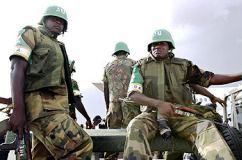UN Council hears if hitches on Darfur force deal
June 13, 2007 (UNITED NATIONS) — Sudan has accepted a United Nations-African Union peacekeeping force of up to 23,000 troops and police for Darfur but some U.N. diplomats fear conditions may be attached.
 The U.N. Security Council gets briefed on Wednesday by Jean-Marie Guehenno, the undersecretary-general in charge of peacekeeping on the deal reached in Addis Ababa, Ethiopia, among the African Union, Sudan and Dmitri Titov, the U.N. director for African peacekeeping missions.
The U.N. Security Council gets briefed on Wednesday by Jean-Marie Guehenno, the undersecretary-general in charge of peacekeeping on the deal reached in Addis Ababa, Ethiopia, among the African Union, Sudan and Dmitri Titov, the U.N. director for African peacekeeping missions.
The briefing comes on the eve of a trip by 15 Security Council ambassadors through five African nations, reaching Khartoum on Sunday.
The AU Peace and Security Commissioner, Said Djinnit, said Khartoum on Tuesday agreed to a “hybrid” force of between 17,000 and 19,000 troops and an additional 3,700 police.
But U.S. and British diplomats questioned if the agreement had conditions, recalling other pacts to resolve the Darfur conflict that had failed to come to fruition.
U.S. Ambassador Zalmay Khalilzad said he had heard Sudan wanted African troops only. Sudanese officials made a similar point on Monday to visiting French Foreign Minister Bernard Kouchner.
The United Nations has said African infantry troops would be given priority in the force but if a sufficient number could not be found, soldiers from other regions would be recruited.
“If it’s conditional, as we hear, that there will be only African troops involved and no non-Africans, that’s putting a condition on the acceptance and that would be unacceptable,” Khalilzad said.
SANCTIONS?
The U.S. ambassador said that without unconditional acceptance, “several of us are of the view that we have to go with additional sanctions” to pressure the government to cooperate on Darfur, where experts estimate 200,000 people have died and 2.5 million have been made homeless by the conflict.
The agreement, first announced in a statement issued in Addis Ababa, follows months of talks, threats and negotiations to persuade Khartoum to accept an effective peacekeeping force in remote Darfur, beset by four years of violence.
The existing African Union peace mission in Darfur relies on the whim of donor nations for funds, a system AU officials blame for problems paying salaries and the demoralization of its 7,000 or so troops and police.
Another issue is control and command of the hybrid force, a new experiment in U.N. peacekeeping.
“Command and control structures should be under the AU with the support of the United Nations,” the head of Sudan’s delegation in Addis Ababa, Mutrif Siddig, told Reuters.
The 40-page U.N. plan glosses over the issue but a U.N. peacekeeping official said the AU should have operational control, and the United Nations overall authority. In practice, he said this meant the AU would run day to day operations but the United Nations could step in if it disagreed.
Some Security Council members are expected to ask for a clearer statement if U.N. members are to authorize the force, pay for it and recruit engineers, military observers and perhaps troops. The full operation is expected to take a year.
The UN-AU proposals have two options for troops, one with 19,500, composed of 18 infantry battalions and another with 17,605, with 15 infantry battalions. Police are estimated at 3,772 officers.
The Darfur conflict dates back to early 2003, when non-Arab rebels took up arms, accusing the government of not heeding their plight in the remote, arid region. Khartoum mobilized Arab militia, known locally as Janjaweed, to quell the revolt.
In the past year, rebels have contributed to the violence, splintering into a dozen factions.
(Reuters)
